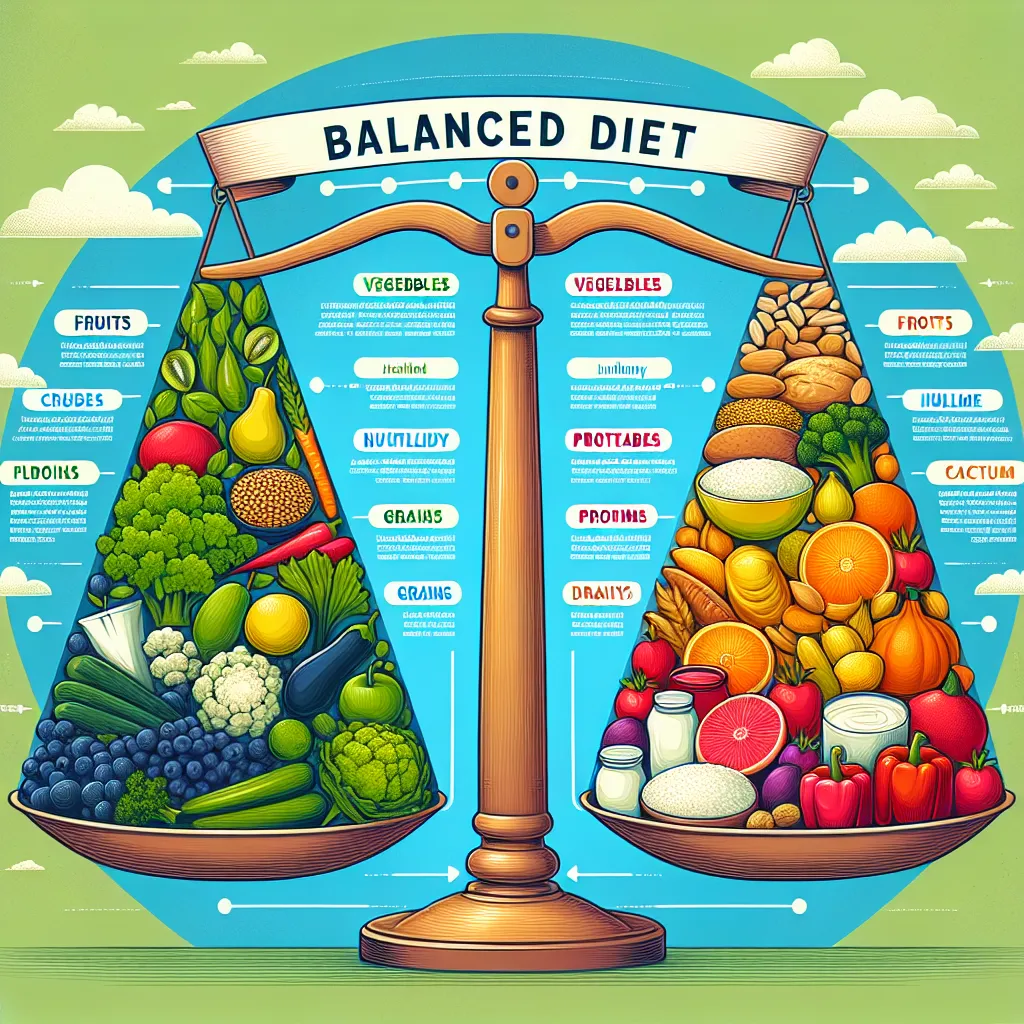Nutritional balance is a crucial concept in health and diet discussions, and it’s particularly relevant for IELTS test-takers. Let’s dive deep into this term, exploring its meaning, usage, and how to effectively incorporate it into your IELTS preparation.
Understanding ‘Nutritional Balance’
Definition: Nutritional balance refers to the consumption of appropriate amounts of essential nutrients to maintain optimal health and bodily functions.
Part of Speech: Noun phrase
Pronunciation: /njuːˈtrɪʃənl ˈbæləns/

Context and Usage
-
Example: “Maintaining a nutritional balance is key to preventing many chronic diseases.”
Analysis: This sentence emphasizes the importance of nutritional balance in health maintenance. -
Example: “The dietitian recommended adjusting my meal plan to achieve better nutritional balance.”
Analysis: Here, the term is used in a professional health context, showing its relevance in personalized diet planning. -
Example: “Studies show that a proper nutritional balance can enhance athletic performance significantly.”
Analysis: This example demonstrates the term’s application in sports and fitness discussions. -
Example: “Schools are implementing programs to teach children about nutritional balance from an early age.”
Analysis: This usage highlights the educational aspect and societal importance of understanding nutritional balance. -
Example: “The new food pyramid guidelines aim to simplify the concept of nutritional balance for the general public.”
Analysis: This sentence shows how the term is used in public health policy and education.
Frequency in IELTS
The concept of ‘nutritional balance’ is moderately common in IELTS, particularly in:
- Reading passages on health, diet, and lifestyle
- Writing Task 2 essays on topics related to public health or food trends
- Speaking Part 3 discussions about health and diet
- Listening sections featuring health professionals or nutritional advice
Vocabulary Analysis
Word Structure
- Nutritional (adjective): relating to nutrition
- Balance (noun): a state of equilibrium or equipoise; equal distribution
Synonyms and Antonyms
-
Synonym: Dietary equilibrium
- Part of Speech: Noun phrase
- Pronunciation: /ˈdaɪətəri ˌiːkwɪˈlɪbriəm/
- Definition: A state of harmony in one’s diet where all nutritional needs are met.
-
Synonym: Balanced nutrition
- Part of Speech: Noun phrase
- Pronunciation: /ˈbælənst njuːˈtrɪʃən/
- Definition: The practice of consuming a variety of foods to ensure adequate intake of essential nutrients.
-
Antonym: Nutritional imbalance
- Part of Speech: Noun phrase
- Pronunciation: /njuːˈtrɪʃənl ɪmˈbæləns/
- Definition: A state where the intake of nutrients is disproportionate, leading to potential health issues.
Memory Techniques
Mind Map
Create a mind map with ‘Nutritional Balance’ at the center, branching out to:
- Essential nutrients (proteins, carbohydrates, fats, vitamins, minerals)
- Food groups (fruits, vegetables, grains, dairy, proteins)
- Health benefits (disease prevention, energy, growth)
- Meal planning (portion control, variety, timing)
Storytelling Technique
Imagine a circus performer balancing on a tightrope. The performer represents your body, and the tightrope is your diet. Various foods are represented by different objects the performer must juggle while maintaining balance. This visual metaphor can help you remember the importance and complexity of nutritional balance.
Practice Exercises
-
Sentence Formation: Write three sentences using ‘nutritional balance’ in different contexts (e.g., personal health, public policy, education).
-
Essay Practice: Write a short paragraph explaining the importance of nutritional balance in preventing childhood obesity. Use at least two synonyms for ‘nutritional balance’ in your writing.
-
Speaking Practice: Prepare a one-minute speech on how modern lifestyles affect nutritional balance. Record yourself and analyze your use of the term and related vocabulary.
-
Reading Comprehension: Find a short article on nutritional balance and identify key vocabulary and concepts related to the term. Summarize the main points in your own words.
-
Listening Exercise: Watch a video on balanced nutrition and take notes on how the concept of nutritional balance is explained and applied.
Conclusion
Understanding and effectively using the term ‘nutritional balance’ can significantly enhance your performance in the IELTS test, particularly in tasks related to health and diet. Remember to practice using this term in various contexts and to explore related concepts like macronutrient ratios and recovery nutrition to broaden your vocabulary and deepen your understanding of this important topic.
We encourage you to apply these learning strategies and share your experiences in the comments below. How has learning about ‘nutritional balance’ improved your IELTS preparation? Do you have any questions about using this term in different IELTS tasks? Let’s discuss and learn together!